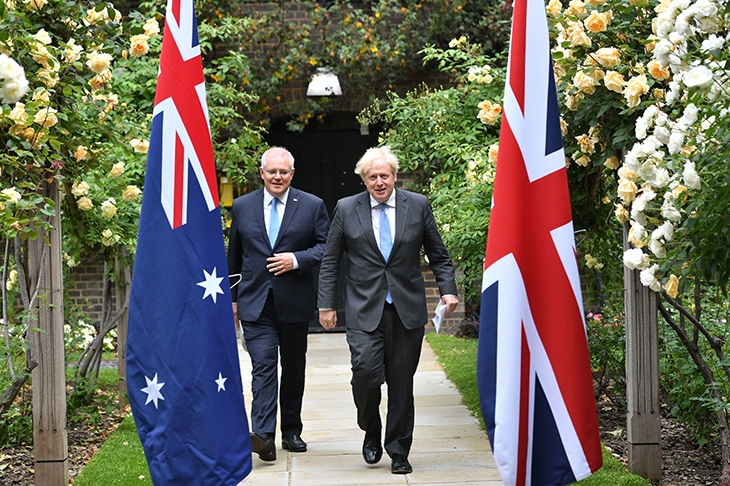If Britain had been unable to agree a trade deal with Australia, then Brexit really would have been pointless. The country is one of our greatest allies and we have no rational reason to fear its beef, its sugar or its people. A free trade deal, aligned with visa-free travel, ought to have been the easiest deal to do.
A deal is now done, phasing in these freedoms over 15 years. But even this sluggish pace is too fast for the protectionists who are popping up. Some have predicted that our beef farmers will be ruined and the countryside laid to waste as our markets are opened to competition. Many of the claims revolve around the fact that just under half of the beef produced in Australia comes from animals treated with growth hormones — a practice banned within the EU. We are assured that such beef will not be seen on British supermarket shelves. But critics seemingly cannot point to any evidence as to why it is harmful to humans or animals — nor why Australia’s food standards authorities would allow it if that were the case.
Further comments have been made about the size of Australian farms, without anyone being able to explain why an animal either knows or indeed cares about the size of the holding on which it is being raised. As long as farm conditions meet normal standards, is this really a sticking point? We can expect such complaints every time a free trade deal is raised. It is a challenge to the government’s ‘global Britain’ agenda.
Boris Johnson retrieved these freedoms in the Brexit campaign, but having acquired them, to what extent can he use them? Or will he feel the need to compromise with Tory protectionists and their ready supply of scare stories?
We have been here before with the negotiations for a US-UK trade deal, news of which quickly descended into a row over chicken washed in chlorine — another practice banned in the EU. The health fears were nonsense in this case too, not least because in Britain we happily drink water which has been chlorinated and eat salads which have been washed in water containing chlorine. Letting these bans stand in the way of comprehensive trade deals is no better than supporting non-tariff barriers to trade — a protectionist device at which the EU excels.
The truth is that the Australia deal could — and should — have been far more liberal. The timetable ought to have been closer to five years than 15. Yes, farmers will always have concerns. But a democratic government ought to side with consumers, giving them the choice. Would it be so bad to have earlier supplies of low-priced, high-quality food from Down Under? Is Australian wine — which was served for the country’s Prime Minister, Scott Morrison, during a reception attended by several cabinet ministers on the eve of the deal — such a threat?
We also ought to have aimed for visa-free travel, allowing all Aussies the freedom to live and work here. We need highly skilled workers, and have missed an opportunity to welcome some (which is timely seeing how many Australians are struggling to return home due to the country’s decision to close its borders). And there are plenty of Britons who would be delighted, when those borders open again, to head the other way. This is the opportunity of Brexit: not to shut ourselves off, but to create new and stronger links to the rest of the world.
So let’s see this trade deal as the start of what an ambitious, globally minded Britain can achieve. Yes, the deal could have been more comprehensive, but it is nothing to belittle either. Those who talk it down point to Australia as Britain’s 20th largest trade partner, accounting for just 1.2 per cent of UK overseas trade. But this ignores the whole point of a trade deal: to increase the volume and value of trade.
It is true that this deal will not, on its own, transform the UK economy. Its real value is in demonstrating that Britain can do trade deals far more quickly when it is negotiating on its own rather than as part of a bloc of 27 countries, each with their own competing demands. The government has already signalled its intent by applying to join the Trans-Pacific Partnership, which could open up trade with another ten countries on the Pacific Rim and, should President Joe Biden decide to rejoin, provide a pathway to freer trade with America. This expanded trade alliance would account for more than 40 per cent of GDP, far bigger than what the EU currently boasts.
Those who argued for the importance of free trade during the referendum should be pleased that goods and services will in future flow more freely between the UK and Australia. The case will need to be made continuously that trade between our nation and the rest of the world is overwhelmingly a force for good. If the full benefits of these deals won’t be felt for some time, then it is vital that the Prime Minister ramps up his pro-trade rhetoric as we wait. He needs the confidence to push for more bullish timelines in the future.
Got something to add? Join the discussion and comment below.
Get 10 issues for just $10
Subscribe to The Spectator Australia today for the next 10 magazine issues, plus full online access, for just $10.
You might disagree with half of it, but you’ll enjoy reading all of it. Try your first month for free, then just $2 a week for the remainder of your first year.














Comments
Don't miss out
Join the conversation with other Spectator Australia readers. Subscribe to leave a comment.
SUBSCRIBEAlready a subscriber? Log in